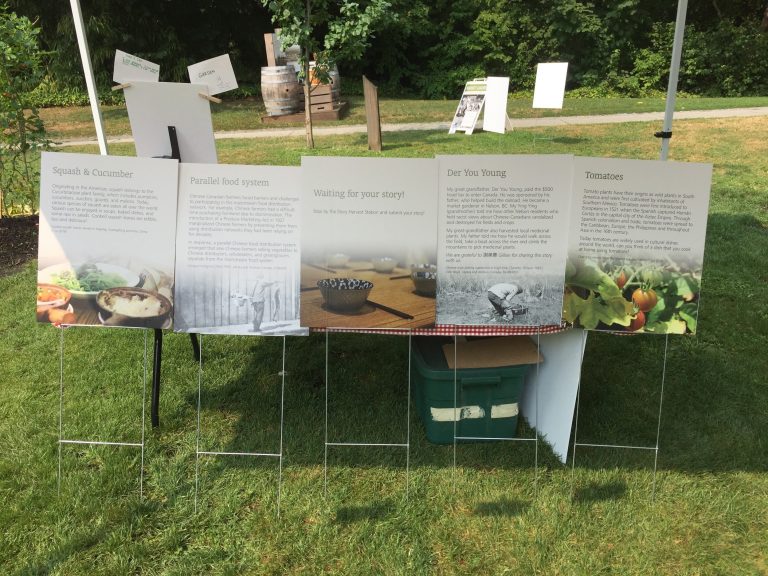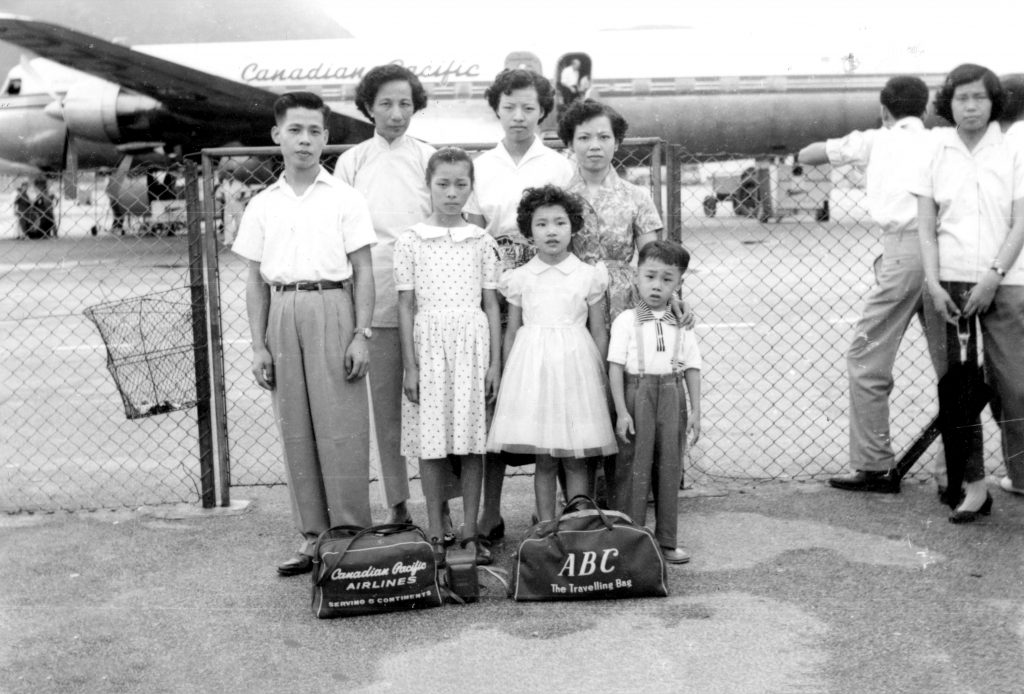From the 2019 cohort:
From the 2018 cohort:
From the 2019 cohort:
From the 2018 cohort:
By Debbie Liang, Joty Gill, Kenny Go, Samantha Chow, Yuko Fedrau
By Farhan Hussain, Jessica Wang, Stephanie Chow, Wei Yan Yeong
By Melissa Kwan, Salomon Micko Benrimoh, Alexa Lizotte, Yahe Li
By Vanessa Chan, Anne Canute, Alston Li, Marcela Gomez, Gillian Chan
We are excited to announce the second year of a joint partnership between the Burnaby Village Museum (BVM) and UBC – specifically, the Asian Canadian & Asian Migration Studies program (ACAM), the Centre for Community Engaged Learning (CCEL), Faculty of Land and Food Systems, Go Global, and St. John’s College (SJC).
Last summer, ACAM, CCEL, Go Global, and SJC units worked with the Burnaby Village Museum to develop an innovative model for Global Engagement, Local Impact, a transformative approach to learning that exemplifies the uniquely international connections and characteristics of the Lower Mainland and Metropolitan Vancouver. This innovative partnership between UBC and the Burnaby Village Museum created a framework that allowed students to travel globally to conduct research and then transfer that knowledge back into a regional setting, thus creating local impact.
Two of the students from 2018, Stephanie Johnson and Jennifer Lu, created the “Story Garden,” and “Story Harvest Station” as historical interpretive experiences, for museum goers to learn about Chinese Canadian history in Burnaby.

“Our term at the BVM was very fulfilling and meaningful. Through the development, prototype, and execution of the Story Card Garden and Story Harvest station, we were able to engage, interact, and learn with museum guests and community members involved with Chinese-Canadian history research at the museum.”
Since 2018, BVM has also worked closely with Denise Fong, PhD student at UBC, who has co-curated the newly opened Across the Pacific exhibit. The exhibit explores the impact of Chinese Canadians in Burnaby since the late 1800s and is presented in English as well as traditional and simplified Chinese – and also includes audio components featuring several Cantonese dialects.
At the heart of this knowledge mobility model is a UBC Go Global summer field studies class: “The Heritage of Chinese Migration – ACAM 390A.” Taught by Professor Henry Yu (History department), this year’s class will immerse 18 undergraduate students in an experiential, qualitative research-intensive academic exchange experience. As a core part of its curriculum, the learning model ties research conducted in a global context to local work opportunities for students in community-based settings.
Upon returning to Vancouver, UBC will employ four students to work at the Burnaby Village Museum. Co-supervised by UBC and Museum staff in July and August, they will be expected to turn their research into interpretive material that can be shared with visitors. This will provide exciting opportunities for students to apply heritage conservation, medicinal eating practices, and migration history from Hong Kong, Singapore and Malaysia to the Burnaby Village Museum’s research, programming, and exhibits. The students are also given a unique opportunity to help imagine and create new interactive educational resources using innovative technology such as virtual reality and augmented reality software.

Pauline Hong (centre) and her mother, Sui Ha Hong, joined Pauline’s father in Canada in 1958. They travelled aboard a Canadian Pacific airplane. Photograph part of the Across the Pacific exhibit at Burnaby Village Museum. Courtesy of the Hong family.
Professor Henry Yu remarks that Burnaby is a particularly apt location for the students to work because of “the long history of local Chinese market-gardens and produce farms along the Fraser River”. For much of the history of the Lower Mainland, Chinese farmers helped feed the local population by growing fresh produce in farms such as those at the “Big Bend” of the Fraser along Marine Drive. Students creating research knowledge about farming in rural China can help us understand sustainable, organic farming techniques historically used by Chinese farmers in Burnaby and the Fraser delta region.
Assistant Curator Jane Lemke is excited that the Burnaby Village Museum, which has long been a popular educational destination for school children and families, can provide this opportunity for students. “With a project as open-ended as this partnership, students get a chance to take their passions and school work and apply it in the real world. They can work with school groups or in an exhibit, such as the newly launched Across the Pacific exhibit, to create access for more diverse audiences.”
UBC students and visitors to the Burnaby Village Museum will benefit from an approach that mobilizes research to make it accessible to local communities.
Jane Lemke
Assistant Curator
jane.lemke@burnaby.ca
Burnaby Village Museum
Joanna Yang
St. John’s College Project Manager
604 827 1874
joanna.yang@ubc.ca
University of British Columbia
Kacey Ng (伍啟詩) is a Hong Kong-Chinese-Canadian Settler on traditional, ancestral, and unceded territories of the xʷməθkʷəy̓əm (Musqueam), sḵwx̱wú7mesh (Squamish), and səl̓ilwətaɁɬ (Tseil-Waututh) peoples. She traces her ancestral home to being from 开平 (HoiPing) and 台山 (ToiSan), although much of her extended family resides in 香港 (Hong Kong). Much of her work is informed by her continuous journey in learning about her heritage and how that impacts her positionality and identity.
She embodies an eager curiosity towards relationship building and connecting with people through places while critically examining the intersections of oppression and marginalization in ethnic minority spaces. Kacey graduated with an Honours in Sociology and a minor Asian-Canadian Asian Migration Studies with intentions to pursue her Masters in Urban Planning. She is now working in balancing teaching assistantships and research assistantships, including, but not limited to the creation of interactive walking tours in Chinatown as an educational tool for students to understand the role of gentrification on Chinese Seniors and local businesses.
Apart from her studies, Kacey can be found on long (very long) walks across the city, making food with / for friends or some variant of procrasti-baking.
Jingyi Wu is a Chinese international student majoring in Visual Arts, with a minor in Asian-Canadian and Asian Migration Studies. She expresses herself primarily through painting, photography, and film, taking on themes of women, body, identity and socio-political issues. In particular, her art speaks to her love of exploring what it means to be an outsider in Canadian society. In the ACAM program, her fascination with Anglo-Asian cultural fusion led her team to produce a Peking opera version of Hamlet. However, her true passion comes from her exploration of what it means to exist in a foreign country, bereft of the safety nets of family and familiarity. To date, she has produced two projects on this subject; a personal film project describing her struggles living as a bilingual International Student in a monoculture, and a group documentary exploring the identity of her fellow female Chinese students, and how they’ve assimilated into Canadian culture. With these projects behind her, Jingyi is turning her focus on the worsening mental health crisis afflicting Mainland Chinese International Students in the Lower Mainland. She hopes to raise awareness among her fellow students who feel the pressure to succeed, and to foster solutions to the benefit of all.
Katie was born and raised in Hong Kong. Growing up, she was passionate about dancing and was trained to be a professional ballerina. The decision to migrate to Canada was made by her mother, who believed Katie and her brother would benefit from the education system here. Moving at age eleven and caught at the edge of being classified as 1.5 generation Asian Canadian, Katie worked hard to overcome language and cultural barriers whilst maintaining connections with those on the opposite side of the Pacific Ocean.
Katie graduated from Burnaby North Secondary School with honours, and was admitted into the Faculty of Arts at the University of British Columbia. Majoring in Sociology and minoring in ACAM, she learned to recognize the issues of social inequality and systemic oppression in today’s neoliberal society. Throughout her time at UBC, Katie also learned the important roles humility and compassion play in achieving social justice, and aims to help create a better world with her knowledge upon graduation.
Coming from Southeast Asian-Chinese heritage, Sarah gravitates towards the spicy flavours and rich density of Asian culture. Her interests led to a lengthy pursuit of an undergraduate degree in UBC’s Asian Studies Department. She majored in Asian Language and Culture specializing in China with a minor in Asian Canadian and Asian Migration Studies. During her time at UBC, she incorporated her experiences as a true millennial Vancouverite mixed with being a second generation Canadian. She is most grateful towards her parents for her culturally mixed upbringing and to her professors for both lending their ears and sharing their dedication. Looking beyond the Western horizon, she hopes her passion can meet her potential in her future endeavours.
Yulanda is a queer Chinese settler born on the traditional territory of the Anishinaabeg and Haudenosaunee Peoples, under the Dish With One Spoon Wampum Belt Agreement. A 2013 Loran Scholar, she is graduating with a Bachelor of Arts in the Gender, Race, Sexuality & Social Justice program with a minor in Asian Canadian and Asian Migration studies. While at UBC, Yulanda coordinated the Pride Collective at UBC, helped revitalize Colour Connected Against Racism, and sat on the student committee for the ACAM Extending the Conversation on Sexual Violence in Asian Communities Dialogues. She is a writer, a community organizer, and a Chinese seniors outreach worker in the Downtown Eastside and Chinatown and the coordinator of the Youth for Chinese Seniors project. Yulanda is a fierce believer in collectivity and possibility, and can be found learning and playing in spaces of magic, community, and utopia.
Russell Chiong is a fourth-generation Chinese-Canadian graduating with a Bachelor of Science, majoring in Environmental Science specializing in Conservation and Ecology, and minoring in Asian Canadian and Asian Migration studies. Born and raised in the beautiful Pacific Northwest on the unceded, occupied, and ancestral territories of the Coast Salish People, Russell has a distinct appreciation for the outdoors, and a love for biking, hiking, and camping. Russell was inspired to join the ACAM program by his work and volunteering in Vancouver’s Chinatown, furthered by his participation in the HIST 482 Go Global Seminar with Dr. Henry Yu in 2017. Minoring in ACAM has allowed him to explore his own cultural identity, meld his passions for social and ecological justice, and create lasting friendships with fellow children of the diaspora. Russell plans to attend law school in the fall, and is particularly interested in the relationships between sustainability movements and diasporic/migrant communities. He hopes to apply the knowledge and experiences from both his major and minor programs towards promoting a more sustainable, equitable, and inclusive future.
Winnie is a second-generation Chinese Canadian tracing ancestry back to 開平 and 九佛 graduating from the Land and Food Systems faculty with a Bachelors of Science in Global Resource Systems, and a Minor in Arts in Asian Canadian and Asian Migration studies. Through her major and minor, Winnie’s studies have explored the intersections between sustainable food and culture, including the closely intertwined history of Chinese Canadians with the local food system here on traditional, ancestral, and unceded territories of the xʷməθkʷəy̓əm (Musqueam), sel̓íl̓witulh (Tseil-Waututh), and sḵwx̱wú7mesh (Squamish) peoples. Winnie is passionate about experiential learning and storytelling, especially as a medium for education, and hopes to combine these passions in pursuing a career in education with the recognition that education happens in many capacities beyond just the school classroom.
